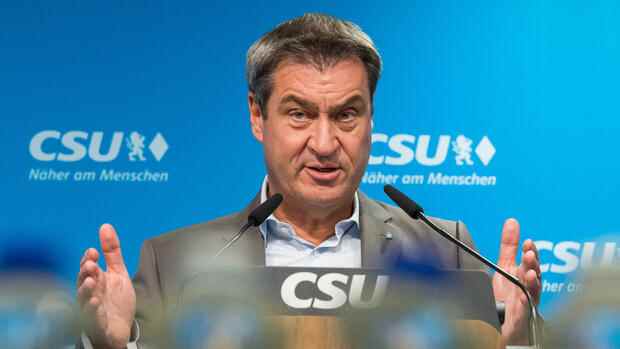Berlin CSU boss Markus Söder calls for comprehensive relief for citizens in view of inflation and the energy crisis. In the “Bild am Sonntag”, the Bavarian Prime Minister spoke out in favor of tax cuts, among other things.
He brought up flatter income tax rates and a massive reduction in VAT on electricity, petrol, heating and all food. “So not just on vegetables, as the Greens want, but also on meat, fish and milk,” said the CSU boss.
Söder also advocates an annual ticket for local public transport throughout Germany at a price of 365 euros. In addition, the so-called tank discount must be extended over the entire winter.
If a winter housing benefit were added for all households, that would help most people noticeably, explained the CSU boss. In addition, Söder spoke out in favor of relieving citizens of state fees.
Söder’s proposals triggered sharp criticism. Baden-Württemberg’s Finance Minister Danyal Bayaz (Greens) dismissed the measures as “political comedy”. The Left Party agreed. The economist Marcel Fratzscher considers most of the demands to be “counterproductive, anti-social, ecologically harmful and extremely expensive”.
Left demands gas price cap
The measures “would mean a redistribution from bottom to top, from poor to rich,” said the President of the German Institute for Economic Research (DIW) to the Handelsblatt. According to Fratzscher, a continuation of the tank discount would prevent urgently needed savings.
>> Read also: Federal Interior Minister Faeser warns of radical protests because of high energy prices
The economist described the reduction in income tax as “highly anti-social” because people with high incomes in particular would benefit from it. The 40 percent of people with the lowest incomes paid no or almost no income tax anyway and would therefore have no benefit from this “very expensive” measure, said Fratzscher.
When it comes to relieving fees, the DIW boss advises a “cautious and differentiated” assessment. “Reliefs, from which people with high incomes in particular benefit, tend to be counterproductive because they limit the financial scope for other, sensible measures,” he said.
Fratzscher considers a reduction in VAT on fruit and vegetables to be sensible. Even if this tends to benefit higher earners, “everyone benefits, and this measure can be implemented quickly”.
The Left Party can also gain something from at least some of the proposals. “It’s a good thing that in Bavaria, too, the realization has grown that there must be a third effective relief package that really compensates for the additional costs for the citizens,” said parliamentary group leader Dietmar Bartsch of the Funke media group.
Bartsch considers the extension of the 9-euro ticket until the end of the year and a follow-up regulation for the next year to be necessary. There should also be a gas price cap. The traffic light government must present such a relief package after the summer break.
Greens are also demanding serious proposals from the opposition
The Greens called for more seriousness in the discharge debate. “We are facing difficult months that can also affect the substance of the feeling of social security in the country,” wrote Green Finance Minister Bayaz on Twitter. Serious, realistic and targeted relief proposals are also needed from the opposition.
Green parliamentary group leader Britta Haßelmann told the Funke media group: “We have a responsibility, especially to support people who already have very little or no financial leeway.” Especially those who depend on basic security, only about one have a small pension or low income, need support.
Haßelmann also advertised a successor to the 9-euro ticket. “The high take-up of the 9-euro ticket shows what a model for success it is,” she said. Here the federal and state governments are now asked to develop ideas as to what a permanent, attractive offer could look like.
>> Read also: Handelsblatt readers support this relief for the high inflation
Politicians in the traffic light government have already promised further relief for citizens. SPD parliamentary group leader Rolf Mützenich pointed to the dialogue process initiated by Federal Chancellor Olaf Scholz (SPD) with trade unions, employers and economists. “I also derive further decisions for possible targeted support of employees and other groups from this,” said Mützenich.
However, the group leader advised against naming specific instruments and their effects right now. “Because it is still unclear in which direction inflation is going, how big the gas shortage will be, how the food supply will be, the price development in individual areas and the immediate aid options.”
Calculations by economic research institutes showed that families and groups in the lower and middle income segments benefited from the measures that had already been decided, said Mützenich. According to a calculation by the Institute for Macroeconomics and Business Cycle Research (IMK) of the trade union-affiliated Hans Böckler Foundation, the measures help families with low incomes in particular.
In the case of a family with two employees, two children and a below-average monthly income, around 64 percent of the foreseeable additional burdens would be offset. For people with basic security, it is even around 90 percent.
More: Germany threatens “social ordeal”: Politicians and economists warn of an escalation of the energy crisis
